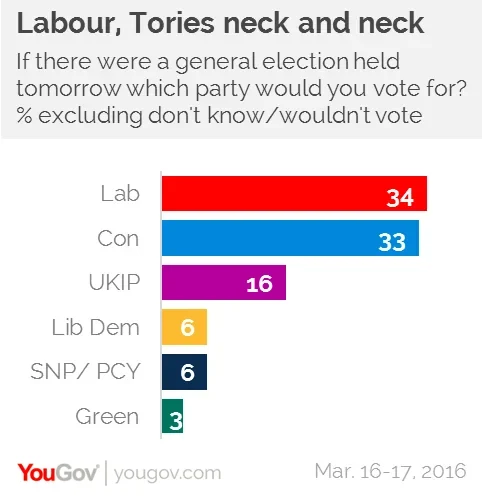Labour and the Conservatives are neck and neck in voting intention, as infighting over Europe weakens the Tory brand
Given the unpopularity of politicians, staying in the background may be Labour's best strategy for regaining support. Our poll today confirms last week's ICM poll showing Labour and the Conservatives neck-and-neck, which at the time was received with scepticism, with ICM themselves saying it could be a rogue. It is always wise to look at the broader trend in opinion polls and with an earlier ComRes also showing the Tory lead falling, it is reasonable to conclude that Euro-squabbles are hurting the party's image.

In recent weeks our polls have found that over two-thirds of the public see the Conservative party as divided. A party that spent several years ruthlessly echoing their "long term plan" is now loudly broadcasting deep internal divisions over the future even though the cause is one that most of the public don't care about.
So playing a quieter, background role may be helpful just now to Jeremy Corbyn. Most ordinary voters won't have much idea about the detail of his policies, nor the ideological divisions within the party. For example, in our poll today 63% of people said they didn't know if George Osborne or John McDonnell would make the better Chancellor. Perhaps people have found it impossible to decide which of the two men they are most impressed with, but it's much more likely they don't even know who McDonnell is.
At this stage in a Parliament voting intention is largely a judgement on the current governing party, rather than a judgement on the opposition, and this accounts for Labour's apparently improving poll numbers. But again, perspective is everything: five years ago Ed Miliband's Labour was ahead by eight points, and still ended up losing by seven.










